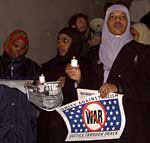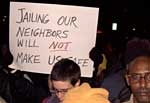By Mary Losure
Minnesota Public Radio
November 9, 2001
A crowd of more than 200 people gathered in Minneapolis Thursday night to support Minnesota's Somali community. It's been hit hard by the federal crackdown on financial organizations allegedly linked to terrorism.
| |
|
|
|
||
Police and customs agents on Wednesday closed three storefronts in the Riverside neighborhood of Minneapolis that housed money-wiring services allegedly linked to Osama bin Laden. The businesses served Minnesota's population of some 50,000 to 60,000 Somali immigrants.
Now, many Somalis fear they'll no longer be able to send money to relatives back in their war-torn country. Thursday night, Somali speakers and some of their neighbors gathered on the steps of one of the buildings closed in the raid.
Ubah Nor says she's supporting her parents and 10 younger brothers and sisters in Somalia. She tried to wire money to her family Wednesday, and found the office closed.
"My brothers and my sister - they are all there, and waiting for me. I called them on the phone, and I tell them, I can't send you money anymore. They cried for me," said Nor. "The landlord tell them, the 6th of the month, this day, they will kick him out. Where are they going to live? In the street?"
The closed wire services are known as hawalas, informal networks that pass money from person to person. Speaker Abdi Hersy said such networks can go where Western Union can't.
He said the hawalas are the only way Somalis can send money to places where there are no banks and no government services, and he worries the hawalas may all be targeted by the government.
"We are asking the United States government if they mean all the hawala is to be shut down? It's a matter of life and death, and there isn't any other provider except the hawalas," Hersy said. "It's a business based on trust. There is people living where there is not even electricity. Hawala get a representative out there."
Federal investigators suspect terrorists are skimming money from the $500 million sent overseas each year by the nation's Somali immigrants. But speaker Halima Abrahim doubted that terrorists linked to Osama bin Laden are getting a share of the money.
"If I send money today or tomorrow my mother, my brother will get the money. And they call me and say, 'We got the $100, the $200 you sent. Then how Osami bin Laden could get that money?" asked Abrahim.
| |
|
|
|
||
The main concern of the Somalis who spoke at the rally was for the fate of relatives back home. But some also expressed fears of a backlash if Americans think Somalis are sending money to terrorists.
Some non-Somalis at the rally charged the raids on Somali businesses were part of a larger loss of civil liberties as the war continues. Some in the crowd held lighted candles and signs saying "Stop the racist roundups" and "jailing our neighbors will not make us safer."
David Miller is a worker at the North Country Cooperative Grocery.
"We did not see this as simply happening to the Somali community. This was happening to our neighbors, our friends, to people we care about," Miller said.
Treasury Department spokesman Rob Nichols was quick to make clear the immigrants themselves are not under suspicion.
"We realize that these Somali immigrants that were using these global terrorist financing networks were not at all aware that they were being duped," said Nichols. "The immigrants, in our view, are completely innocent. They are not a target of the investigation. These are folks who are not going to be questioned with regard to their use of this hawala."
So far federal officials have not released any evidence showing links between the money wiring services and terrorism.
Agents seized papers and computers, and Nichols says that evidence is being taken back to Washington for analysis. He says the money wiring services' assets will remain frozen as long as the investigation continues.
He says in the meantime, Somali immigrants can use other companies that haven't been linked to bin Laden's Al-Qaida network.
However, a spokesperson for the Somali Justice Advocate center says the five remaining services in the city were not operating Thursday, for fear of being shut down by government authorities.
More from MPR

